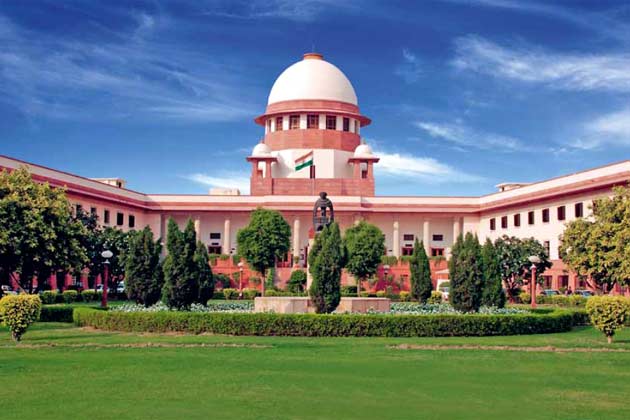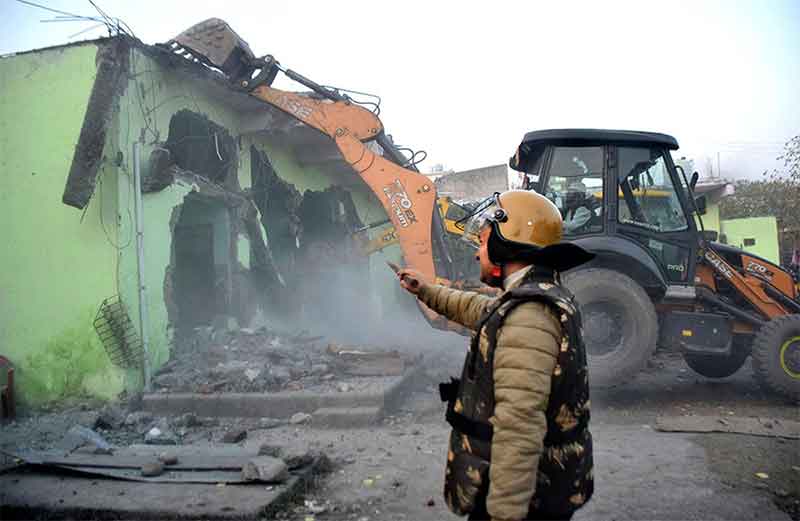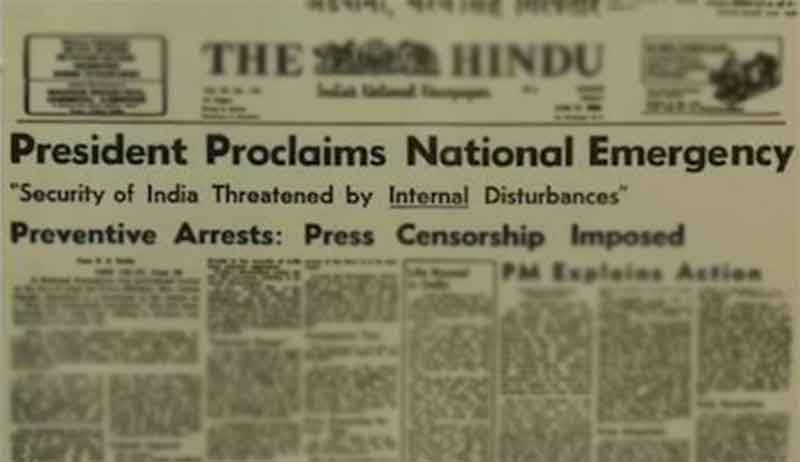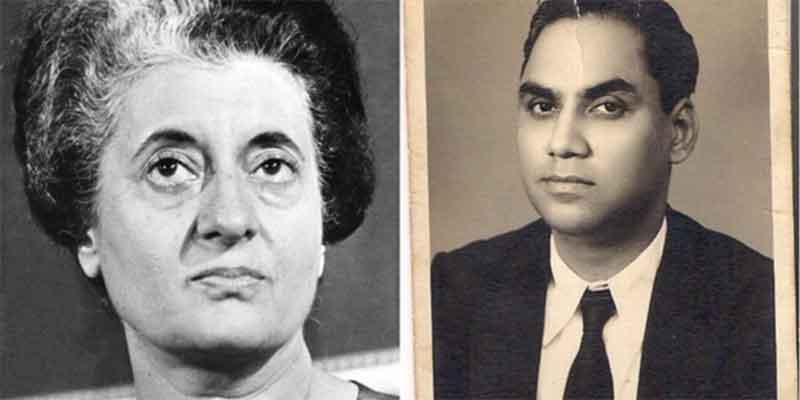
Co-Written By Dr. P.S. Sahni & Shobha Aggarwal
On 25th June, 1975 the then Prime Minister of India, Mrs Indira Gandhi imposed a state of Internal Emergency primarily to stay in power; earlier the Allahabad High Court had unseated her in a petition filed by a political rival Mr. Raj Narain who had challenged her election to LokSabha for election malpractices. The developments that followed constitute one of the darkest chapters in the history of India. The sufferings, humiliation and torture of people under this dictatorial regime continued for a period of twenty-one months. Fear was sought to be instilled through the mid-night knock by the police force; custodial torture was all too frequent and cases of disappearance like that of Rajan remain a chilling reminder of those times. Over a hundred thousand people were thrown in jails without trial using preventive detention laws like Maintenance of Internal Security Act (MISA) and Defence of India Rules (DIR); this included practically the entire class of opposition members of Parliament, trade union leaders; university students, karamcharis and professors; journalists; ordinary men and women; social and political activists. Press censorship was imposed. Some publications stopped bringing out their newspapers/magazines rather than submit to pre-censorship. However the vast majority of journalists and owners of media houses succumbed to political pressure. The All India Radio and the Doordarshan of course were under governmental control and churned out propaganda material day in and day out. Rumours had a field day. People disturbed by these developments would meet at ‘safe’ public places, look over their shoulder to ensure that police informers and intelligence bureau personnel were not hanging around; even then talks would be in whispers. Handmade posters with political messages were pasted surreptitiously at public places; leaflets printed at safe printing presses were passed on as part of resistance movement; but invariable even this, too, resulted in arrests.
In Delhi alone over 700,000 people residing in slums and even pucca houses were uprooted without any prior notice; the Muslim houses and shops in Old Delhi were targeted. Bulldozers were used to demolish hutments and dwelling units. Even police firing was resorted to, killing and maiming the poor and the hapless who as much as resisted the demolition. These people were dispatched to open land on the periphery of the entire city where resettlement colonies were sought to be built. Social activists – who ‘dared’ to hand over a memorandum to Sanjay Gandhi, the son of the Prime Minister and an extra-constitutional authority – were got arrested and sent to Tihar Jail. There were no avenues for justice; hence the underground resistance movement.
A program of mass vasectomy was pursued with utmost zeal; several million people including unmarried ones were subjected to this physical and psychological trauma. Thousands died during or after surgery. The police with the help of local Congress goons would round up people for vasectomy and bring them to hospitals in police vans. The issue of consent for vasectomy was not even addressed to, converting it into a compulsory family planning drive.
Since most opposition members of Parliament were jailed; and press faced ruthless censorship, some daring people in detention resorted to writ petitions in High Courts; equally brave and liberty loving judges in nine High Courts entertained these petitions. These High Courts sent a message that even after the declaration of an Emergency a detenue could challenge his detention. The Supreme Court overruled these nine High Courts in the habeas corpus case – bulldozing the consensus opinion expressed by the nine High Courts. Out of the five Supreme Court judges only one, Justice H.R. Khanna dissented. A para out of his dissenting judgement need to be always remembered:
“Supposing a law is made that in the matterof the protection of life and liberty, the administrativeofficers would not be governed by any law and that it wouldbe permissible for them to deprive a person of life andliberty without any authority of law. In one sense, it mightin that event be argued that even if lives of hundreds ofpersons are taken capriciously and maliciously without theauthority of law, it is enforcement of the above enactedlaw. As observed by Friedmann… in a purely formal sense, any system ofnorm based on a hierarchy of orders, even the organised massmurders of Nazi regime qualify as law.”
[Additional District Magistrate Jabalpur v. Shivakant Shukla, 1976]
Postscript
- A division bench of the Supreme Court speaking through Justice Gangulyin Remdeo Chauhan @ Rajnath Chauhan vs. Bani Kant Das & Others opined:
There is no doubt that the majority judgment of this court in the ADM Jabalpur case (supra) violated the fundamental rights of a large number of people in this country. Commenting on the majority judgment, Chief Justice Venkatachalliah in the Khanna Memorial Lecture delivered on 25.2.2009, observed that the same be ‘confined to the dustbin of history.’
Delivered in the year 2010 this judgement was pronounced on November 19 – the birth anniversary of Indira Gandhi!
- However it would still be a year before Justice P.N. Bhagwati, one of the authors of the infamous 1976 judgement said sorry with ifs and buts thrown in for good measure. On 16 September 2011, speaking to the Indian Express, Justice P.N. Bhagwati said:
“I was wrong. The majority judgment was not the correct judgment. If it was open to me to come to a fresh decision in that case, I would agree with what Justice (H R) Khanna did. I am sorry (for the judgment) …
“Initially, I was not in favour of the majority view. But ultimately, I don’t know why, I was persuaded to agree with them. I was a novice at that time, a young judge…I was handling this type of litigation for the first time. But it was an act of weakness on my part.”
A Ray of Hope
A positive scene emerging globally is the belated apologies offered by the Supreme Court judges for their erroneous decisions through their earlier judgements dating back to several decades. Just two examples should suffice.
Firstly, in September 2013 Chile’s Judges apologized for their passive complicity with the Pinochet regime. In 1970 Salvador Allende became the President of Chile through open elections. Augusto Pinochet staged a coup on September 11, 1973 and toppled the socialist Salvador. The military regime under Pinochet ruled Chile with an iron fist till 1990. It suppressed political parties, persecuted dissidents; suspended the 1925 constitution;banned tradeunions; used media to promote anti-democratic policies; limited civil rights of people; severely curtailed freedom of the press. The judiciary became a mere spectator and lost its independence. The Chilean courts rejected about 5000 cases seeking assistance to locate missing loved ones/ abducted/or killed. The Chilean Judges’ Association in a statement almost forty years after the coup said:
“To those who are victims of state abuse … the time has come to ask for the forgiveness of victims … and of Chilean society.
… It must be said and recognized clearly and completely: the court system and especially the Supreme Court at that time, failed in their roles as safeguards of basic human rights and to protect those who are victims of state abuse.” [Merco Press September 5, 2013]
Secondly, in Japan the Supreme Court apologized for discriminatory treatment of its leprosy patients. The Japan Times issue dated April 25, 2016 reported:
The Supreme Court apologized Monday to former leprosy patients for allowing lower courts to hold criminal trials involving them outside standard courtrooms over ungrounded fears about the spread of infection, saying such false practices were unlawful and further accelerated discrimination.
In a 60-page report, the top court stated that “discriminatory handling was strongly suspected” for special trials held after 1960, and violated the laws governing court procedures. It said the Supreme Court granted lower courts permission to hold such trials at sanitariums and other facilities for leprosy patients without fully examining each case.
… As for the constitutional right of the principle of equality, Supreme Secretary-General YukihikoImasaki only said its violation was “strongly suspected.” Such discriminatory practices “encouraged prejudice and discrimination against the patients, and furthermore, impaired their integrity and dignity,” the report said. “(We) deeply regret it and apologize to the patients.”
The Indian Supreme Court never tires of asking for apology for this or that inanity usually for some perceived contempt of court. The Supreme Court ought to cultivate and demonstrate its sensitivity to its earlier decisions which were contemptuous of the people of India. The judges of the Supreme Court are servants of the people. In a democracy it is the people who are supreme. About time the Supreme Court en banc tenders an unconditional apology to the mass victims of state abuse during 1975-77, as also to the entire people of India.
[The writers are members of PIL Watch Group (non-funded, non-party) and can be contacted at: [email protected]]
















































